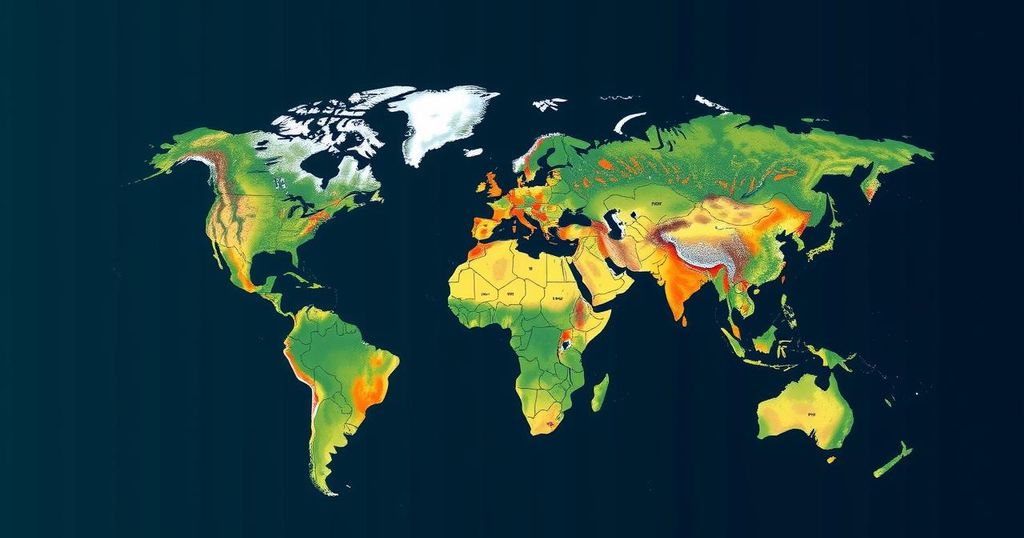The Emergence of Just Transition Litigation: Ensuring Fairness in Climate Policies
A global trend is emerging where individuals and communities are utilizing courts to challenge the fairness of climate policies, highlighted by the concept of “just transition litigation.” This form of litigation focuses on ensuring social justice amid the transition to a low-carbon economy, addressing concerns from various groups potentially disadvantaged by environmental changes. Recent cases reveal the necessity for inclusive decision-making processes that protect vulnerable communities while promoting equitable climate policies.
Recent advancements in climate litigation have highlighted a significant shift in the legal landscape as individuals and communities worldwide are utilizing the courts to challenge the fairness of climate policies. Workers in the coal industry are suing governments for job losses, while Indigenous communities are contesting the implementation of wind farms and anti-deforestation measures that encroach upon their cultural rights. These cases, labeled as “just transition litigation” in a study published in Nature Sustainability, aim to ensure that the transition to a low-carbon economy is conducted with fairness and social equity, particularly for vulnerable populations. Unlike traditional climate litigation that primarily seeks to hold governments and corporations accountable for failing to meet emission targets, just transition litigation focuses on the social consequences of environmental policies. This distinctive form of litigation gained visibility as the researchers observed a growing number of such cases since 2020. Notable examples include a legal victory by coal union workers in Chile, where the Supreme Court underscored the importance of involving affected communities in discussions about the phase-out of coal. Similarly, in Norway, the Sami Indigenous people successfully argued against wind farm licenses that violated their cultural practices, demonstrating the need for all voices to be heard in the transition process. Additionally, in Colombia, Indigenous groups contested deforestation initiatives on their ancestral lands, asserting their fundamental rights to self-determination and cultural integrity. The emphasis of just transition litigation is on achieving justice amidst the necessity for a greener economy. Groups often underrepresented in decision-making, including workers affected by job loss and minority communities, are increasingly seeking legal recourse to voice their grievances. Recognizing their concerns as substantive rather than dismissing them as mere local opposition is crucial for developing equitable climate policies. The emergence of just transition litigation reflects a growing acknowledgment that climate change initiatives may disproportionately burden marginalized communities. While efforts to lower greenhouse gas emissions are paramount, enhancing the equity of these measures is equally essential, particularly as governments expedite their transitions to sustainable practices. The study advocates for inclusive and transparent policymaking, emphasizing that decisions affecting land rights and employment must incorporate input from those directly impacted. The pursuit of justice in climate action will not only protect vulnerable populations but will also cultivate broader public support for sustainable policies. As communities continue to seek legal remedies, it is imperative that policymakers prioritize equity and fairness in their approaches to climate strategies, thereby ensuring that the transition to a sustainable future is both just and inclusive.
The growing trend of just transition litigation marks a significant shift in the approach toward climate justice frameworks. This movement arises from the recognition that while climate policies aim to reduce emissions and foster sustainability, they frequently overlook the social implications that these policies have on various communities. As a response to increasing advocacy for social justice within environmental frameworks, the concept of just transition litigation is gaining traction, allowing affected individuals to seek redress through legal channels. This distinguishes it from traditional climate litigation that primarily concentrates on corporate accountability and government compliance without considering the socio-economic impacts on vulnerable groups.
The rise of just transition litigation underscores a critical understanding that climate action must be equitable to gain widespread support. The courts are becoming a platform for marginalized groups to claim their rights and address grievances stemming from climate policies. Policymakers are urged to incorporate inclusive and transparent decision-making processes to ensure that the transition to a low-carbon economy does not exacerbate existing inequalities. By acknowledging and addressing the concerns of all segments of society, particularly those most affected, there is a greater chance of fostering broad public commitment to climate initiatives.
Original Source: theconversation.com




Post Comment